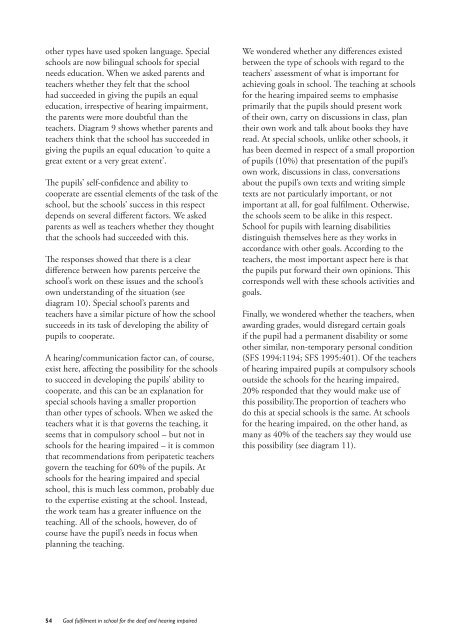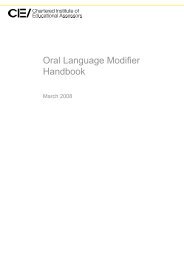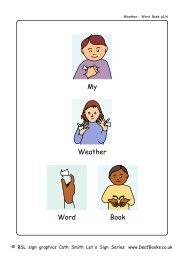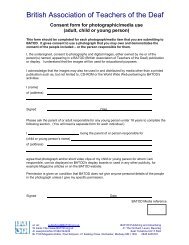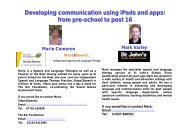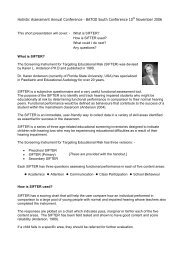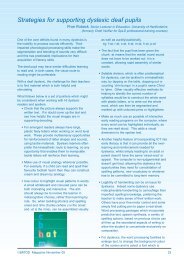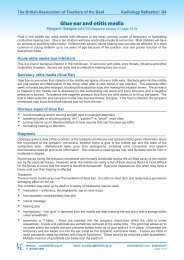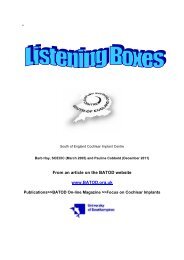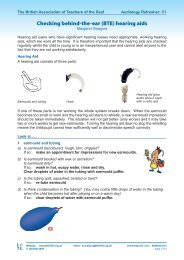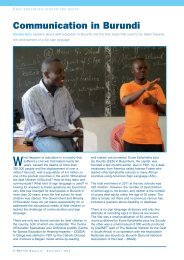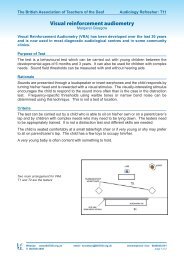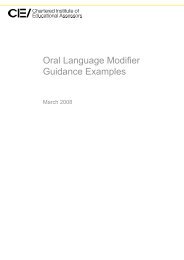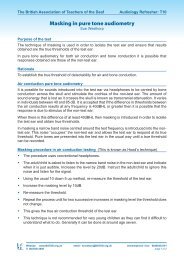Goal fulfilment in school for the deaf and hearing impaired - batod
Goal fulfilment in school for the deaf and hearing impaired - batod
Goal fulfilment in school for the deaf and hearing impaired - batod
- No tags were found...
Create successful ePaper yourself
Turn your PDF publications into a flip-book with our unique Google optimized e-Paper software.
o<strong>the</strong>r types have used spoken language. Special<strong>school</strong>s are now bil<strong>in</strong>gual <strong>school</strong>s <strong>for</strong> specialneeds education. When we asked parents <strong>and</strong>teachers whe<strong>the</strong>r <strong>the</strong>y felt that <strong>the</strong> <strong>school</strong>had succeeded <strong>in</strong> giv<strong>in</strong>g <strong>the</strong> pupils an equaleducation, irrespective of hear<strong>in</strong>g impairment,<strong>the</strong> parents were more doubtful than <strong>the</strong>teachers. Diagram 9 shows whe<strong>the</strong>r parents <strong>and</strong>teachers th<strong>in</strong>k that <strong>the</strong> <strong>school</strong> has succeeded <strong>in</strong>giv<strong>in</strong>g <strong>the</strong> pupils an equal education ‘to quite agreat extent or a very great extent’.The pupils’ self-confidence <strong>and</strong> ability tocooperate are essential elements of <strong>the</strong> task of <strong>the</strong><strong>school</strong>, but <strong>the</strong> <strong>school</strong>s’ success <strong>in</strong> this respectdepends on several different factors. We askedparents as well as teachers whe<strong>the</strong>r <strong>the</strong>y thoughtthat <strong>the</strong> <strong>school</strong>s had succeeded with this.The responses showed that <strong>the</strong>re is a cleardifference between how parents perceive <strong>the</strong><strong>school</strong>’s work on <strong>the</strong>se issues <strong>and</strong> <strong>the</strong> <strong>school</strong>’sown underst<strong>and</strong><strong>in</strong>g of <strong>the</strong> situation (seediagram 10). Special <strong>school</strong>’s parents <strong>and</strong>teachers have a similar picture of how <strong>the</strong> <strong>school</strong>succeeds <strong>in</strong> its task of develop<strong>in</strong>g <strong>the</strong> ability ofpupils to cooperate.A hear<strong>in</strong>g/communication factor can, of course,exist here, affect<strong>in</strong>g <strong>the</strong> possibility <strong>for</strong> <strong>the</strong> <strong>school</strong>sto succeed <strong>in</strong> develop<strong>in</strong>g <strong>the</strong> pupils’ ability tocooperate, <strong>and</strong> this can be an explanation <strong>for</strong>special <strong>school</strong>s hav<strong>in</strong>g a smaller proportionthan o<strong>the</strong>r types of <strong>school</strong>s. When we asked <strong>the</strong>teachers what it is that governs <strong>the</strong> teach<strong>in</strong>g, itseems that <strong>in</strong> compulsory <strong>school</strong> – but not <strong>in</strong><strong>school</strong>s <strong>for</strong> <strong>the</strong> hear<strong>in</strong>g <strong>impaired</strong> – it is commonthat recommendations from peripatetic teachersgovern <strong>the</strong> teach<strong>in</strong>g <strong>for</strong> 60% of <strong>the</strong> pupils. At<strong>school</strong>s <strong>for</strong> <strong>the</strong> hear<strong>in</strong>g <strong>impaired</strong> <strong>and</strong> special<strong>school</strong>, this is much less common, probably dueto <strong>the</strong> expertise exist<strong>in</strong>g at <strong>the</strong> <strong>school</strong>. Instead,<strong>the</strong> work team has a greater <strong>in</strong>fluence on <strong>the</strong>teach<strong>in</strong>g. All of <strong>the</strong> <strong>school</strong>s, however, do ofcourse have <strong>the</strong> pupil’s needs <strong>in</strong> focus whenplann<strong>in</strong>g <strong>the</strong> teach<strong>in</strong>g.We wondered whe<strong>the</strong>r any differences existedbetween <strong>the</strong> type of <strong>school</strong>s with regard to <strong>the</strong>teachers’ assessment of what is important <strong>for</strong>achiev<strong>in</strong>g goals <strong>in</strong> <strong>school</strong>. The teach<strong>in</strong>g at <strong>school</strong>s<strong>for</strong> <strong>the</strong> hear<strong>in</strong>g <strong>impaired</strong> seems to emphasiseprimarily that <strong>the</strong> pupils should present workof <strong>the</strong>ir own, carry on discussions <strong>in</strong> class, plan<strong>the</strong>ir own work <strong>and</strong> talk about books <strong>the</strong>y haveread. At special <strong>school</strong>s, unlike o<strong>the</strong>r <strong>school</strong>s, ithas been deemed <strong>in</strong> respect of a small proportionof pupils (10%) that presentation of <strong>the</strong> pupil’sown work, discussions <strong>in</strong> class, conversationsabout <strong>the</strong> pupil’s own texts <strong>and</strong> writ<strong>in</strong>g simpletexts are not particularly important, or notimportant at all, <strong>for</strong> goal <strong>fulfilment</strong>. O<strong>the</strong>rwise,<strong>the</strong> <strong>school</strong>s seem to be alike <strong>in</strong> this respect.School <strong>for</strong> pupils with learn<strong>in</strong>g disabilitiesdist<strong>in</strong>guish <strong>the</strong>mselves here as <strong>the</strong>y works <strong>in</strong>accordance with o<strong>the</strong>r goals. Accord<strong>in</strong>g to <strong>the</strong>teachers, <strong>the</strong> most important aspect here is that<strong>the</strong> pupils put <strong>for</strong>ward <strong>the</strong>ir own op<strong>in</strong>ions. Thiscorresponds well with <strong>the</strong>se <strong>school</strong>s activities <strong>and</strong>goals.F<strong>in</strong>ally, we wondered whe<strong>the</strong>r <strong>the</strong> teachers, whenaward<strong>in</strong>g grades, would disregard certa<strong>in</strong> goalsif <strong>the</strong> pupil had a permanent disability or someo<strong>the</strong>r similar, non-temporary personal condition(SFS 1994:1194; SFS 1995:401). Of <strong>the</strong> teachersof hear<strong>in</strong>g <strong>impaired</strong> pupils at compulsory <strong>school</strong>soutside <strong>the</strong> <strong>school</strong>s <strong>for</strong> <strong>the</strong> hear<strong>in</strong>g <strong>impaired</strong>,20% responded that <strong>the</strong>y would make use ofthis possibility.The proportion of teachers whodo this at special <strong>school</strong>s is <strong>the</strong> same. At <strong>school</strong>s<strong>for</strong> <strong>the</strong> hear<strong>in</strong>g <strong>impaired</strong>, on <strong>the</strong> o<strong>the</strong>r h<strong>and</strong>, asmany as 40% of <strong>the</strong> teachers say <strong>the</strong>y would usethis possibility (see diagram 11).54 <strong>Goal</strong> <strong>fulfilment</strong> <strong>in</strong> <strong>school</strong> <strong>for</strong> <strong>the</strong> <strong>deaf</strong> <strong>and</strong> hear<strong>in</strong>g <strong>impaired</strong>


